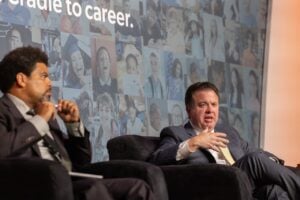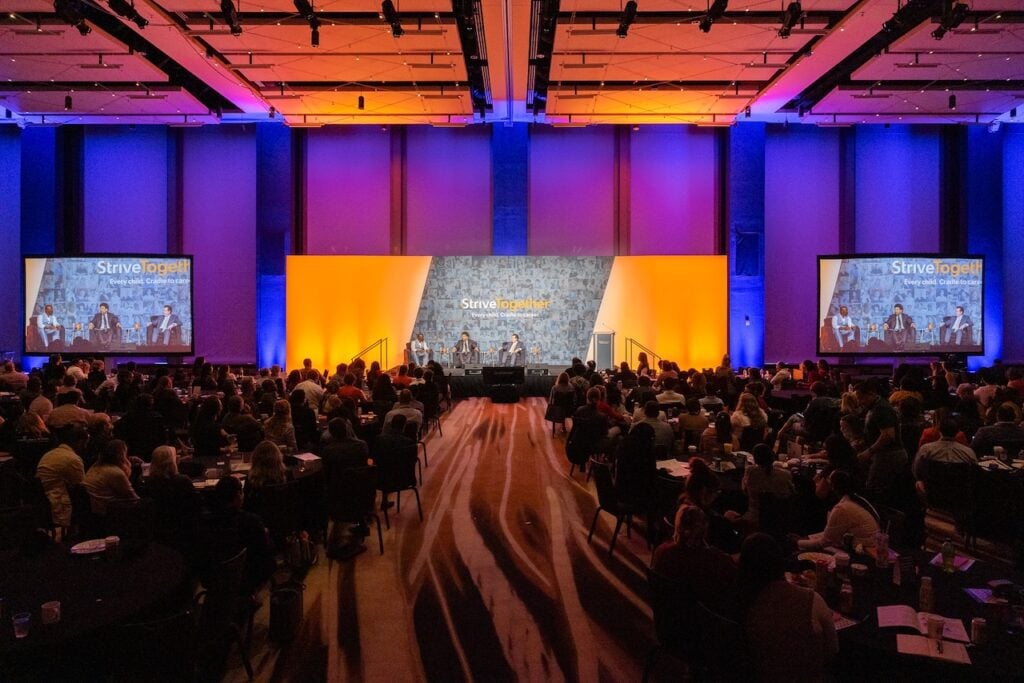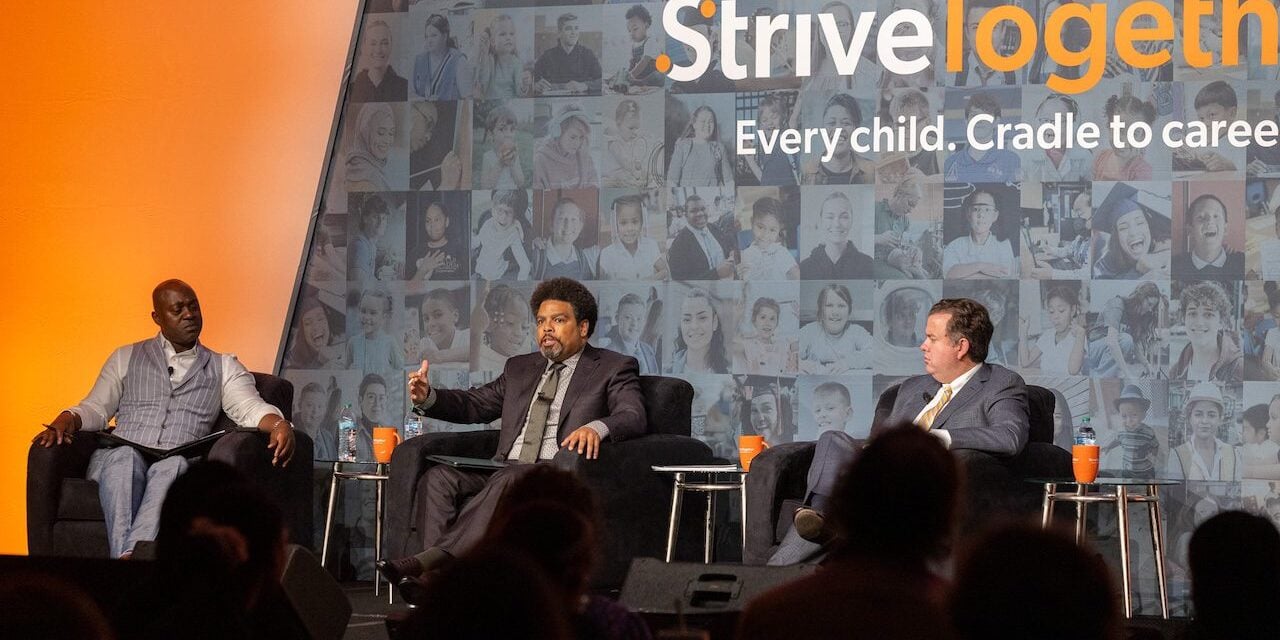As I stepped onto the stage to moderate the opening plenary at the 2025 Cradle to Career Network Convening, I could feel the weight of the moment. Hundreds of leaders from across the country filled the room, representing the strength of the Cradle to Career Network. These were leaders who spend their days in schools and city halls, at nonprofits and neighborhood tables, working to create better futures for young people.
Beside me sat Professor Darrick Hamilton and Dr. Michael Strain — two leaders who approach policy from different perspectives but share a commitment to improving lives. Professor Hamilton, an economist at The New School, is known for bold ideas like baby bonds that challenge us to reimagine what’s possible. Dr. Strain, who directs economic policy studies at the American Enterprise Institute, emphasizes dignity and the promise of mobility.
As the conversation began, it became clear that both share a commitment to children, families and communities. Together, they highlighted the urgency of this moment and why the work of the Cradle to Career Network is so vital. What followed was an honest and hopeful dialogue. Their perspectives helped us see more clearly what it will take to create an economy that works for all children and families, and it reminded us why place-based partnerships are essential to building an economy that works for all.
The purpose of an economy
Professor Hamilton began with a challenge: to flip the way we think about our economy. Too often, he argued, “We manage people, especially those in poverty, as surplus populations. We regulate their choices, limit their opportunities and then blame them for outcomes beyond their control. What would happen if we turned that paradigm on its head and invested in people instead?” 
“The purpose of an economy should be people,” Hamilton continued. “It should center children and families, providing the conditions they need to thrive. That means affordable housing and child care, quality education, access to capital and good jobs. It means systems designed not to manage poverty but to unlock possibility.”
The numbers tell us how far we have to go. The top 10% of American households hold about 67% of the nation’s wealth. The bottom half holds less than 2.5%. For Black, Latine and Native American families, the wealth gap is even wider. Nearly 40% of families in this country don’t have $400 in reserves to cover an emergency expense.
This, Hamilton argued, is where trust begins to break down. When people work hard and still can’t get ahead, when they see rules tilted against them, their belief in the system falters. Trust is not abstract — it is measured in paychecks that cover the bills, homes that families can afford and opportunities that children can see for themselves.
That’s why Hamilton has championed baby bonds, publicly funded trust accounts that give every child, especially those born into low-wealth families, a capital foundation for the future. By the time a young person reaches adulthood, that account could be used for postsecondary education, a down payment on a home, or seed money for a small business. In other words, the privileges of wealth would no longer be limited to those who happen to be born into it.
Strain acknowledged that while he might design policies differently, he sees the logic in investing early and giving families a foundation to succeed. Both agreed that bipartisan interest in policies signals an important moment, proof that across political lines, leaders are recognizing the need to expand opportunity and rebuild trust in the systems that shape people’s lives.
Policy grounded in place
Both Hamilton and Strain underscored a truth the Cradle to Career Network knows well: strong policy has to be rooted in the realities of place.

Strain pointed to workforce partnerships that bring together local employers, educators and community organizations to build training programs tailored to regional needs. These programs prepare workers for jobs, and they connect people to careers that match the opportunities in their own communities. The question, he said, is how we scale these promising local models while respecting the unique context that makes them work.
Hamilton added that policy must be paired with power. Communities need the resources and authority to shape their own futures. That means ensuring people can participate fully in economic and civic life as agents of change.
This is where place-based partnerships shine. Across the Cradle to Career Network, local coalitions are aligning data, strategy and resources to expand opportunity. They are connecting families to housing, health care, early learning and jobs. They are using their collective power to influence state and federal policy.
We see it in Wisconsin, where four Network members worked together to secure a $380 million state investment in early childhood and literacy. We see it in Maryland, where the ENOUGH Act is investing in place-based partnerships — from schools and housing to health care and civic systems — to empower local leaders, reduce barriers and ensure that families can fully participate in community life. And we see it in Colorado, where the Civic Influencer Fellowship Program at Rocky Mountain Partnership Cradle to Career is equipping young leaders with skills in civic leadership, policy and advocacy and data-driven decision making — preparing them to eliminate policy barriers.
Each of these examples reflects the same truth: trust is rebuilt when opportunity is tangible. Families see systems differently when they experience them working on their behalf. Communities believe in possibility when progress is visible and young people gain confidence when the path ahead feels real. When local partnerships thrive, they show what democracy looks like in practice: neighbors and institutions working side by side, solving problems and building futures together.

Carrying the Conversation Forward
As the session drew to a close, I was struck by how much common ground emerged. Both speakers, in their own way, called for an economy that delivers on the promise of mobility. Both reminded us that families cannot be treated as expendable and children cannot be treated as afterthoughts. And both made clear that policy has to be more than words on paper. It has to translate into opportunities people can see and feel in their daily lives.
The conversation between Professor Hamilton and Dr. Strain underscored something essential. Perspectives may differ, but shared values can point the way forward. If we agree that every child deserves a real chance, then our conversations become about which policies and strategies will get us there. That’s how progress happens. That’s how trust is rebuilt.
Dr. Strain put it best when he urged us to stay curious rather than siloed: “Be willing to change your mind, be willing to listen to others who you disagree with. You’re either going to change your mind or you’re going to strengthen your own views.”
For the Cradle to Career Network, this is not abstract work. Every data point we track, every partnership we strengthen, every policy we influence is part of restoring trust. By centering children and families, we are proving that systems can deliver. Strong starts lead to strong futures and by working together, we can make those futures possible for millions of young people.






